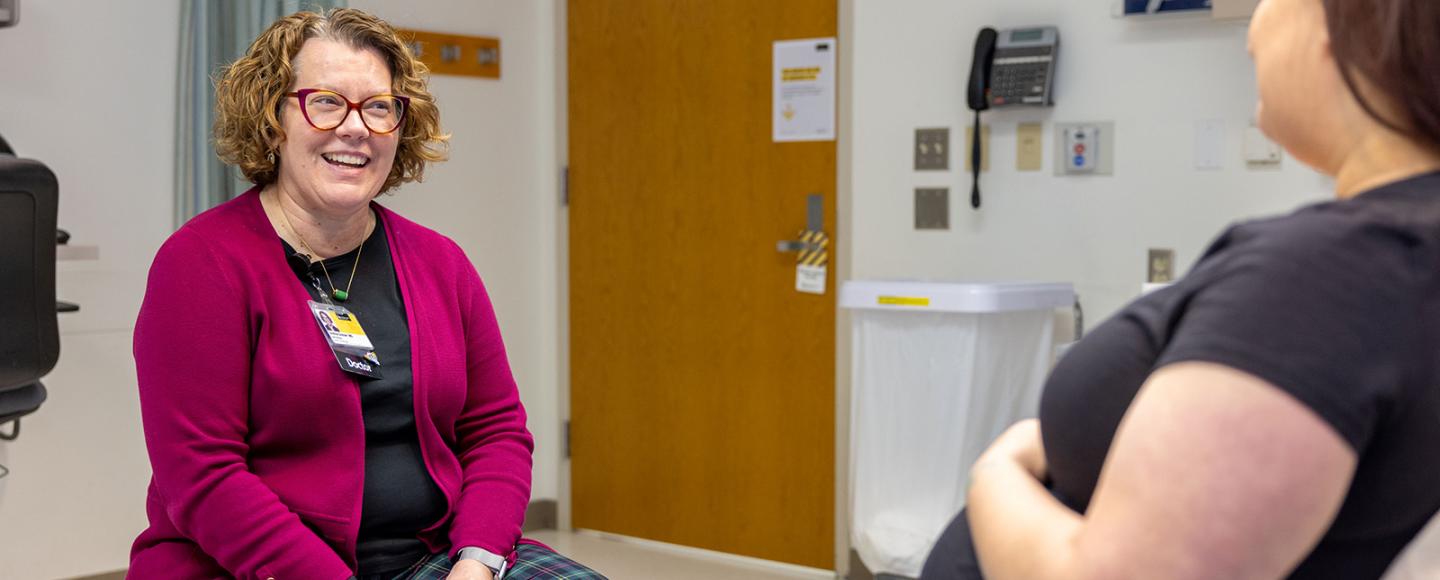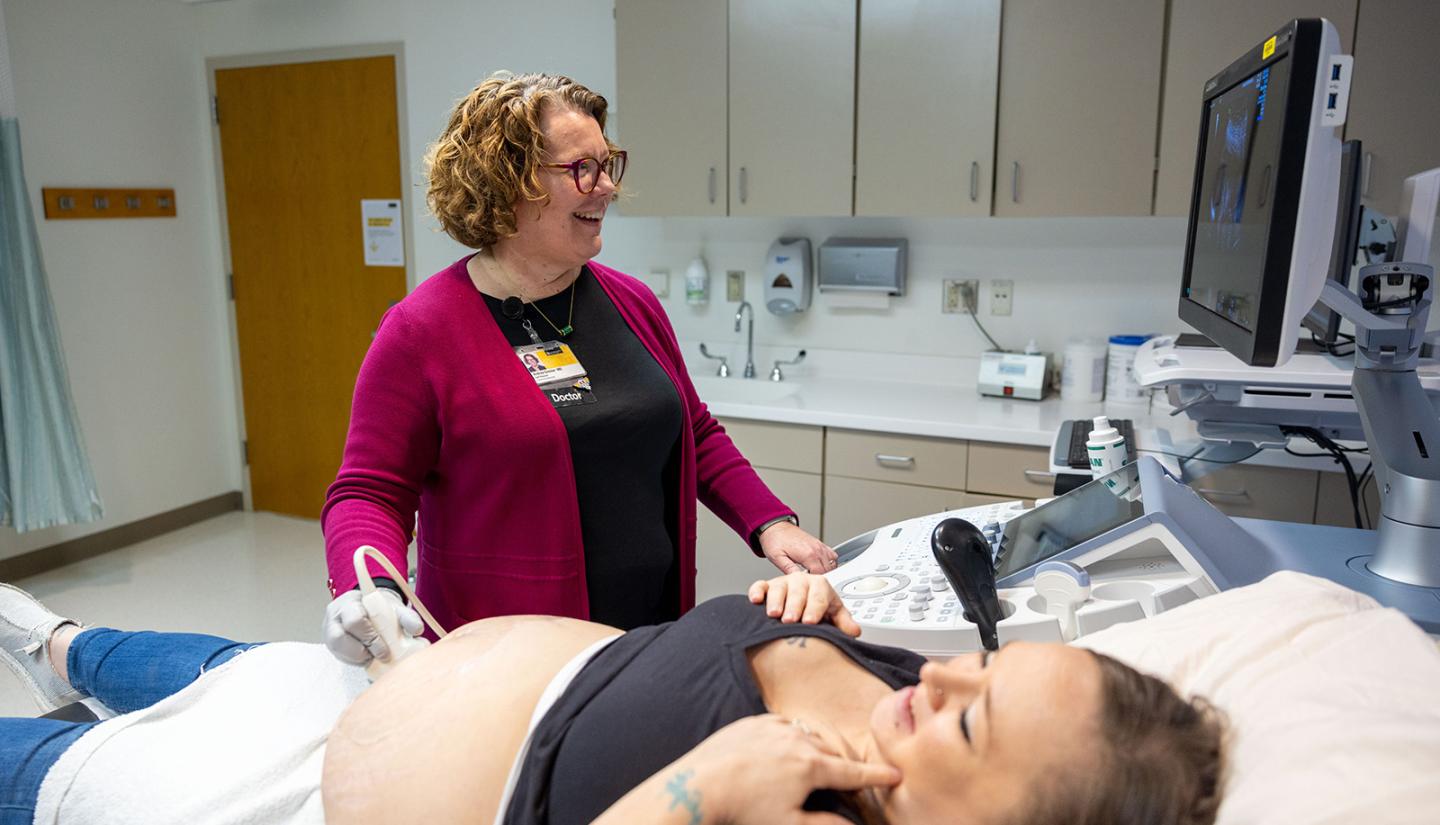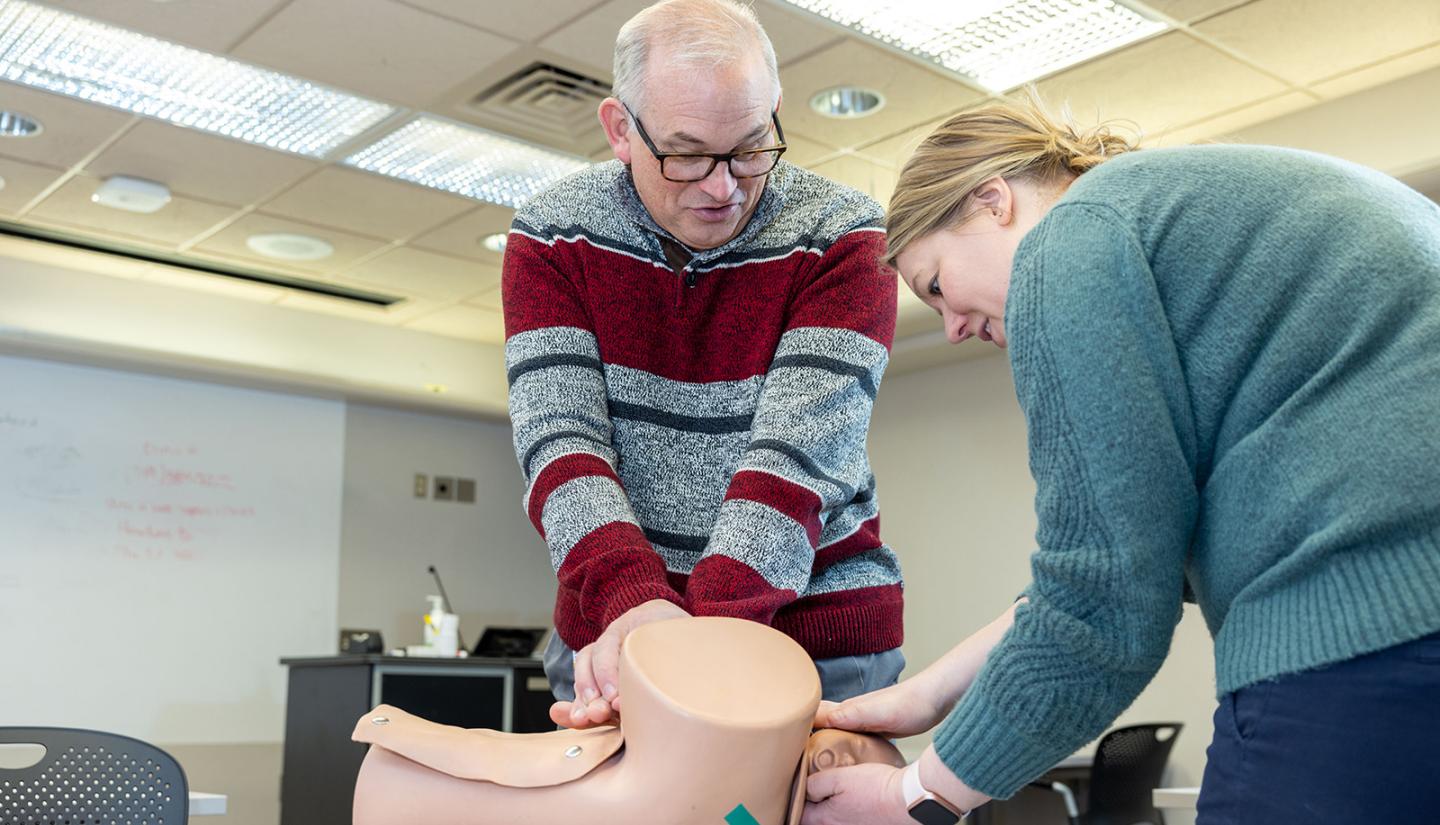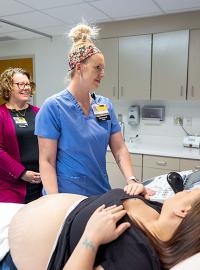Table of ContentsClose

Delivering help to address Iowa’s obstetric care needs
UI Health Care teams are leading collective efforts to fill OB care gaps—particularly in rural areas of the state.
One by one, hospital obstetric units are disappearing across Iowa, creating potentially dire consequences for pregnant mothers and their babies. Since 2000, 31 Iowa counties—most of them rural—have closed their obstetric services. By 2020, just 46 of the state’s 99 counties had at least one hospital that provided obstetric services, down from 77 counties in years prior.
“We’re seeing an increase in the number of babies across Iowa delivered in ambulances or on the side of the road,” says Jeffrey Quinlan, MD, FAAFP, professor and chair of the University of Iowa Department of Family Medicine.
It’s not just deliveries that are in peril. Iowa has the fewest OBGYNs per capita of any U.S. state, according to the American College of Obstetricians and Gynecologists. Iowa also is one of five states with the highest losses of access to obstetric care over the past 13 years.
Across Iowa, expectant mothers often face long drives to get the care they need, particularly specialist care for high-risk pregnancies. The farther that pregnant women must travel for care, the greater the risks of morbidity for the mother or the infant.
“We see worse outcomes when people have to travel more than an hour to get to the hospital to deliver their baby,” says Stephanie Radke, MD, MPH, clinical associate professor in the UI Department of Obstetrics and Gynecology.
One of UI Health Care’s overarching priorities is to fix this growing problem, including by providing training to rural pockets throughout the state. UI Health Care is also expanding its obstetrical care capabilities: 8% of the state’s deliveries occurred at UI Health Care in fiscal year 2023—a 24% increase since fiscal year 2019.
Iowa’s OB care gaps
57%
Of Iowa counties do not have an obstetric facility.
14%
Of women do not have a birthing hospital within 30 minutes—compared to 9.7% nationwide.
22.3%
Of babies were born to women living in rural counties in Iowa.
33%
Of counties have no OB providers and no facilities offering OB care.
11.3%
Of all births occur in maternity care shortage areas
61%
Of UI Health Care’s deliveries and obstetric visits were for patients living outside Johnson County (home to Iowa City).
Sources: March of Dimes, UI Health Care
Community training and outreach
Once a month, a team of UI physicians and nurses from the Departments of Obstetrics and Gynecology, Anesthesia, and Family Medicine travels to emergency rooms at community hospitals across Iowa. Because these predominantly rural hospitals lack obstetric units, pregnancy and delivery care often falls to their emergency room providers.
Over one or two days, the UI team uses a mannequin to simulate delivery and common obstetric complications such as severe postpartum bleeding, the leading cause of maternal mortality worldwide. The local ER teams gain additional experience in delivering babies and identifying and treating complications.
“This is one way that, as departments and an institution, we’re trying to help on the frontlines where patients live,” says Andrea L. Greiner, MD, MHA, vice chair and clinical professor in the Department of Obstetrics and Gynecology.
While the number of obstetric facilities and providers across Iowa declines, the rate of obstetric complexities has risen, including a greater average maternal age; increased risks for obesity, diabetes, and high blood pressure among mothers; increased pre-delivery hospital stays; more premature births; and more babies requiring neonatal intensive care units.
“We’re seeing more patients every month who come to UI Health Care for their deliveries because there are fewer local options for patients to get seen,” Quinlan says.

Building obstetric capacity
Since the early 2000s, the labor and delivery unit at UI Hospitals & Clinics has been designed to handle about 1,600 births per year. In 2023, the unit delivered nearly 3,000 babies, and it expects to reach 4,000 annually in the next few years.
“We’ve had to deliver more babies in the same amount of space and the same number of hospital rooms,” Greiner says.
As more Iowans rely on UI Health Care for obstetric care, additional capacity is needed to accommodate current patients and prepare for future needs. Several solutions to improve access to maternal health services were incorporated into the university’s master plan, and planning is underway.
Strengthening OB skills across Iowa
Even with more space, the UI Health Care specialists know their teams cannot fulfill all of Iowa’s obstetric needs. As such, they’re working to bolster the obstetric skills of hospitals and providers across Iowa—in part with the support of a five-year, $10 million grant from the federal Health Resources and Services Administration.
With its mobile simulation program, UI Health Care is teaching obstetric skills to ER teams and providers who haven’t necessarily been trained in OB care but are increasingly being called on to provide it. Similarly, under the leadership of Quinlan and family physician Sarah Jorgensen, DO, UI Health Care teams are traveling to rural Iowa hospitals that provide maternity care and teaching them advanced skills to address obstetric emergencies through the American Academy of Family Physician’s Advanced Life Support in Obstetrics course.
Historically, family physicians have provided—and continue to provide—the majority of OB care in rural settings. But faced with the prospect of providing around-the-clock coverage with fewer colleagues to share the workload, some family doctors are opting not to practice obstetric care.
“The existing pool of family physicians who deliver babies is shrinking as people retire every year,” Radke says.
OB care as part of family medicine residency training
Working to help family medicine physicians become more confident and comfortable with obstetric care is key. Under Quinlan’s leadership, UI Health Care is teaching birth simulation and providing birth simulators to the state’s family medicine residency programs.
“Residents can practice their skills before they have to use them on patients,” Quinlan says.
With an appreciation for the obstetric care that family doctors often must provide, Quinlan has helped develop an operative obstetric fellowship for family medicine residency graduates at the UI, with family doctors learning to perform obstetric operations such as cesarean deliveries.
“Training family doctors in operative obstetrics will help provide ongoing and safe care to patients in rural Iowa,” Quinlan says.
UI Health Care also has implemented a rural obstetrician track for its OB resident physicians. Each year, a few interested OB residents spend a significant amount of their time training and working with obstetricians in rural-based communities.
“They can see themselves working in small towns because they experience it and work with people who do it and enjoy it,” Greiner says.

Nurse-midwifery education, additional collaborative efforts
In 2023, UI Health Care launched the state’s first certified nurse-midwifery education program, welcoming its inaugural class of students. The program intends to address Iowa’s growing need for certified nurse-midwives to improve health outcomes, especially in underserved and rural areas.
The UI nurse-midwifery program is one of several initiatives made possible by Iowa Maternal Health Innovation Program, a five-year project of the Iowa Department of Health and Human Services in collaboration with UI Health Care.
UI Health Care support of other hospitals and providers across the state also will be enhanced and formalized by the Maternal Levels of Care (MLC) verification program. Developed by the American College of Obstetricians and Gynecologists in partnership with The Joint Commission, MLC is a voluntary verification program that defines and designates the level of obstetric care a hospital can provide—from basic care to the highest level of care that UI specialists provide. To maintain its top-level status, UI Health Care will continue training staff at other Iowa hospitals.
Under Radke’s leadership, the Iowa Maternal Quality Care Collaborative (IMQCC) helps health care facilities and providers practice safe obstetric care. IMQCC works with all 56 Iowa hospitals that have labor and delivery units by running in-person and virtual quality improvement sessions. These sessions help physicians and nurses improve their obstetric care—for instance, by learning to reduce unnecessary cesarean deliveries that can lead to complications for mothers and babies, how to prevent and treat obstetrical hemorrhage, and how to manage preeclampsia and other high blood pressure conditions unique to pregnancy.
Additionally, Radke will soon take over leadership of the Iowa Statewide Perinatal Care Program from OBGYN colleague Stephen Hunter, MD, PhD (93R, 96F). In this program, UI Health Care obstetric and neonatal experts visit the state’s hospitals, review their patient charts, and provide valuable feedback on what went well and what could be improved.
“We’ll see the best outcomes for women delivering in our state if every place practices to the current standards of best care,” Radke says.

Learn to Grow
Midwives deliver almost 30% of babies born at rural U.S. hospitals. With nurse-midwifery programs in high demand, the University of Iowa Health Care recently launched the state’s first such program. To learn more or for interested applicants, visit uihc.org/NMEP.
